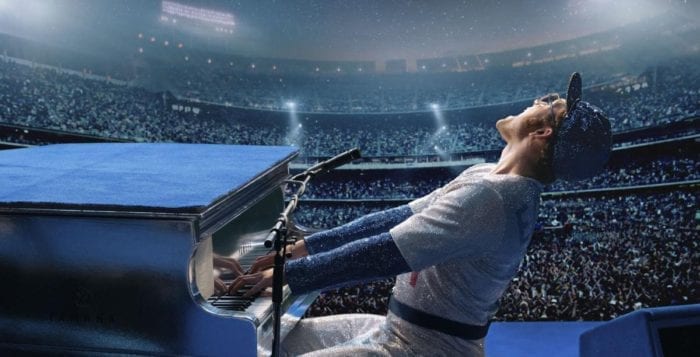By Jeffrey Sanzel
Elton John: So how does a fat boy from nowhere get to be a soul man?
Wilson: You got to kill the person you were born to be in order to become the person you want to be.
The first moments of “Rocketman” easily establish the world in which this film will take place. In full demonic costume, Elton John descends on a rehab group therapy session. This serves as the framework throughout this unusual musical.
Promoted as “based on a true fantasy,” this is less a biopic of Elton John (who produced) but a fantastical rumination on the power and price of superstardom. Chronology and accuracy of time line are flexible at best but this by no means is a complaint. The result is a flashy, frenetic and wholly engaging two hours where we are treated to John’s rise and ultimate self-destruction.
The movie is both a traditional and a unique musical, most often using the songs to further the story rather than focusing on his concert career. The unusual gambit pays off in Dexter Fletcher’s imaginative direction of Lee Hall’s scattered but satisfying screenplay.

The film shifts quickly from the rehab group therapy as John literally steps into his past. A cold and distant father (an appropriately uncomfortable Steven Mackintosh) paired with an indifferent and narcissistic mother (Bryce Dallas Howard, in an ugly but believable performance) fuel his need to find himself.
“I wish I was someone else,” laments his boyhood self, Reginald Dwight. With the encouragement of a benevolent grandmother (the always wonderful Gemma Jones), he begins to take piano lessons, graduating to a scholarship at the Royal Academy of Music.
The film hopscotches through the next years as he begins playing with the pub band, Bluesology. The story then hits the highlights. These include connecting with music publisher Dick James (a cigar-and-scenery-chewing Stephen Graham), meeting and working with his longtime lyricist Bernie Taupin (a saintly Jamie Bell) and his debut at the Troubadour, a Los Angeles club. It is here he meets John Reid (Richard Madden, a little too full-on villain) who becomes his manager and his lover.
Much of the film follows this destructive relationship. John then begins the transition to the flamboyant persona that would carry him through much of his career. With success comes a life of excess as he becomes embroiled in alcohol, drugs and sex.
The film’s center needs to be its heartbeat. In the starring role Taron Egerton creates a mesmerizing, three-dimensional performance and even provides his own vocals. Egerton smoothly arcs from the inhibited Reggie to the outrageous but equally self-doubting
Elton John. He manifests a complete rainbow of humanity, with shades of loneliness showing through even the grandest moments. Egerton is a marvel and drives the entire film.
As for the music, nearly two dozen songs are used, including “The Bitch Is Back” (a fascinating opening), “I Want Love” (highlighting the family’s dysfunction), “Saturday Night’s All Right for Fighting” (chronicling his early years), “Honky Cat” (embracing his life of indulgence), “Rocketman” (an attempted suicide and recovery), “Bennie and the Jets” (spiraling down), “Goodbye, Yellow Brick Road” (emphasizing his break with Taupin), as well as various concert moments.
Special note should be made of Adam Murray’s interesting, sometimes dreamlike and often athletic choreography. Costume designer Julian Day’s reimaging of Elton John’s spectacular wardrobe is a whirlwind of sequins, feathers and glitter.
The creators chose not to present the last three decades of his life, instead opting for a quick summation, including sobriety, marriage and fatherhood. While it would have been nice to follow his recovery and the second act of his career (“The Lion King,” “Candle in the Wind,” etc.), it finds an appropriate ending to an epic journey. “Rocketman” is thoroughly entertaining with all of the glitz and razzle-dazzle one would expect to celebrate this legendary icon.
Rated R, “Rocketman” is now playing in local theaters.





